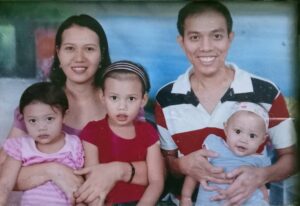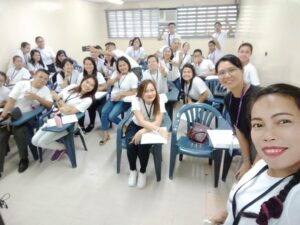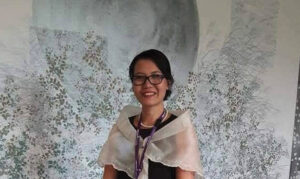Q. Could you tell us about your background and how you joined JPEPA program?
In May 2009 I made the hardest decision a mother could make. My application went very smoothly. Upon assessment of my documents and experience, I was qualified to be a Nurse Candidate under the JPEPA program. The only tradeoff was that I needed to undergo training in Nihongo, the Japanese language, before I could work in a hospital in Japan. Everything went well and in almost just 2 months, my job contract came out.
As a mother, it was very difficult for me to decide. But the foremost thought for me was that I will be doing it for my family and so I was willing to sacrifice. Besides Japan was not too far away — I could go home every year I thought. So, I chose to entrust our 3 daughters to my husband. My sister was also on hand to assist them just in case.
Q. How were your first weeks in Japan?
I can’t forget that date when I left my family and went to Japan as a member of the first-ever batch of JPEPA candidate-nurses. Excited, happy, nervous, sad – all those emotions mixed in one swirl. My heart was broken leaving my 3 daughters, still babies then. But the future beckoned: I was doing it all for them, and it steeled my heart to continue.
I went to Japan with zero knowledge of the language. It was really very shocking that I could not understand anything. Wherever I looked, everything was written in Nihongo. I asked myself: “Can I survive here? How can I work? How can I pass the Nursing Licensure Examination?” But I could not back out anymore. I had to accept the fact that I was already in Japan, so I just embraced everything. I made myself believe that everything can be learned if one had the perseverance, the courage, and the determination
Q. Can you talk about your experience learning Japanese?
During the first 6 months, we stayed in Kansai Kenshuu Center (AOTS-Osaka) for language training. At first, it was really tough since I did not know how to read, how to write – I did not know anything at all. Our teachers were all Japanese. They taught us in Japanese and so we could not understand what they were saying, we could not understand the lectures. They could understand a bit of English, yes, but they had difficulty explaining the lessons in that language. There were times when I just looked at their gestures or actions and guessed what they were saying. After a month or 2, I could cope with the lessons and was able to learn Nihongo little by little. But everyday our lessons became harder and harder. I remember there were 2 of us who gave up and quit. They went back home to the Philippines.
Q. When did you start working at a hospital in Japan?
After 6 months of struggle in the language training, we were dispatched to our respective facilities. I was very nervous because I was not confident in my knowledge of Nihongo. In my case, I was a bit lucky because there were 3 of us EPA nurses assigned in the same hospital. We were welcomed by the staff of the hospital. We were so nervous and embarrassed. There were also reporters and photographers and we were interviewed. That day we found ourselves on the news!

Q. How did you balance study time with work?
Our employer was very supportive of us. In the afternoon, they gave us time to continue our studies. Twice a week a Nihongo teacher would come to the hospital and teach us. On other days, our head nurse would teach us medical terms and kanji.
We lived in the dormitory of the hospital just a few minutes-walk from the hospital. We worked 5 days a week. During our first few days at work, I was very quiet unless someone would start the conversation because I was ashamed of my Nihongo. Later on, I started talking even though I felt I was saying the wrong things. For practice, every morning I would go from room to room in the hospital and introduce myself in Japanese to all the patients.
Q. Did you have any trouble adjusting to life in Japan?
Sometimes, I felt so tired and exhausted and I started to miss my family. There was no Facebook yet at that time. The quickest means of communication were email and telephone. It was really very difficult working abroad away from your family. Still, we were very happy that we were welcomed by our colleagues and later they became our friends.
Q. Would you tell us your experience of taking the Nurse Licensure Examination?
In February 2010, we took the Nurse Licensure Examination for the first time. Actually, we did not want to take the examination because we knew that we were not going to pass. After all, we only had 6 months of training in the language. Our knowledge of the language, especially the medical terms were really not enough. But our employer insisted that we should take the examination for us to experience or have an idea of how the Japanese Nurse Licensure Examination was.
So, out came the results. We all failed as expected. With all due respect, our employer bought us reviewers and other books for review. But the problem was we did not have teachers who could teach us. We had to study on our own. Medical terms and kanji were very difficult and we had to research on our own the meaning and reading of the kanji. Sometimes when our Head Nurse and other colleagues were not very busy, they would ask us how we were doing and if we had questions regarding our studies. Those were the times we could ask them, but most of the time we studied on our own.
Q. It must have been difficult for you studying medical terms in foreign language. When did you retake the exam?
We took the Examination for the second time in February of 2011. The results came again and as in the first time we did not pass. The results this time were better, however, and so our employer believed that we could make it the next time. It was really difficult, especially for us non-native Japanese speakers because everything was written in Nihongo. Besides, there were also some Japanese who failed the exam. So, I thought: If some Japanese nurses had difficulty passing the board exam despite their knowledge of the language, how much more Filipino like me?
I was facing the difficult situation of my family back home. I was tired of studying and I did not know for sure if I could pass the exam for the last time. If I decide to continue, what if I passed the exam? Then I will forever be away from my family. How about my kids? That really bothered me.
Q. Do you have any unforgettable experiences in Japan?
I enjoyed talking to my patients. There was a stroke patient who was admitted in the medical ward for recovery and she was having therapy every day because one side of her body was paralyzed. Despite her slurred speech, she was very eager to have conversations with me every day NOT in Nihongo but in English. I just let her talk to me in English as part of her speech therapy. After a month when she was about to be discharged from the hospital, she went to the nurse’s station looking for me and when I saw her, I told her “退院 おめでとうございます!”. She hugged me and started crying. I was surprised! She thanked me and wished me good luck in my studies, in my work, in my life in Japan, and she said to me “how I wish I could do something to help you pass the Kokka Shiken to give your kids a better future.” I was touched and couldn’t help my tears fall. All the other nurses in the station were all teary-eyed looking at us. After one year, she came back to the hospital for her annual check-up. Again, she was looking for me; when I saw her, I did not recognize her until she introduced herself. She was very different from the last time we saw each other. She was fully recovered from the stroke. She was wearing a business suit because she just came from her office. I was very happy to see her again and I was so touched that she did not forget me.
Q. What made you decide to go back to the Philippines?
During my first vacation, I found out that in the one year that I was away I already missed a lot of the childhood days of my 3 kids. I spent my birthday that year in the Philippines with my family. We were all very happy to see each other again. My youngest daughter was already 1 year old by then and she could not remember me. When I asked her “Where is your Mommy?” she answered: “My mommy is in Japan, she is on the computer!” I was not able to witness many of their activities in school and I got to see those only in photographs.
In May 2011, I again took a vacation for the second time because I wanted to see my family’s situation personally so I can decide if I will continue in Japan or not. As soon as I saw my second child, I knew she really needed a mother by her side.
At her age, she was already 4 years old then, I thought her speech ability was lagging. We were worried and so my husband consulted our pediatrician who referred us to a specialist for assessment. As it was, our second child was diagnosed as suffering from a communication disorder, specifically Expressive Language Disorder. She can understand what she hears if someone is talking to her, but she has difficulty expressing the words. The specialist suggested that our child undergo speech therapy at least twice a week.
My husband got so busy as he had to bring our second child to the speech therapist before he went to work. Sometimes he was actually required to attend the therapy session for him to learn how to continue the activities or therapy at home as continuing intervention. Due to this situation, I was bothered also. There were times that I could not concentrate on my studies because I was thinking of my family, especially my kids.
So, my husband and I discussed all the pros and cons and we ended up with the decision that I will not continue anymore because the kids needed me.
As soon as I came back to Japan, I talked to my supervisor regarding the situation of my family here in the Philippines and my decision not to continue anymore with my contract. They were surprised with my decision but my employer was so kind that they understood my situation. Thus, in December of 2011, I went home to the Philippines for good.

Q. What message would you give future candidates to inspire them to pursue the EPA program?
In hindsight, my experiences working as a nurse in Japan has taught me many things just as I was able to form some opinions and judgments about it all, including the EPA program then:
- The greatest enemy anyone can ever have while working abroad is homesickness, especially for those who already have their own families (the mothers in particular);
- On the other hand, the greatest allies anyone can ever have while working abroad, especially for the first-timers, are perseverance and making friends even of the locals
Still, I am very much grateful for the EPA program for all the learnings that I had been privileged to gain through the years of working in Japan. Since coming home to the Philippines for good, I was able to put to good use my Nihongo: teaching the same language to prospective nurses and caregivers. I have been doing it for 7 years now!

